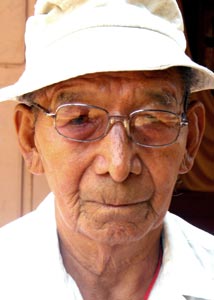Name: Karma Wangdu
(Alias: No)
Gender: Male
Interview Age: 85
Date of Birth: 1925
Birthplace: Tsona, Utsang, Tibet
Year Left Tibet: 1959
Profession: Trade
Monk/Nun: No
Political Prisoner: No

Interview No.: 46M
Date: 2010-04-13
Language: Tibetan
Location: Doeguling Settlement, Mundgod, Karnataka, India
Categories: Chinese Invasion and Occupation
Keywords: childhood memories, Chinese -- first appearance of, Chinese army -- invasion by , Dalai Lama -- escape, escape experiences, farm life, resistance, trade, Utsang
Summary:
Karma Wangdu hails from the village of Tsona, which is located very close to the Indian border. The villagers were farmers and he describes why farming is done on the slope of a mountain because crops do not bear fruit if cultivated on the plains. The villagers also went on trade expeditions to Bhutan and Mon Tawang [Arunachal Pradesh, India]. The main trade items from Tsona consisted of wool and woolen cloth and in return they purchased chili, paper and carved wooden items.
Karma Wangdu saw His Holiness the Dalai Lama when he passed through Tsona on his way to India during his escape. Karma Wangdu speaks about how the villagers felt and the preparations made for passage by cutting away ice and clearing snow on the mountain pass. It was a highly emotional occasion for the people of Tsona.
Karma Wangdu describes the arrival of the Chinese in Tsona and people enlisted to form a resistance, but they were outnumbered by the thousands of Chinese soldiers. He also witnessed the arrival of the first Chinese vehicles in Lhasa and the Chinese celebration of the event, which included participation by the Tibetan army, monks and aristocrats of the Tibetan government.
Interview Team:
- Rebecca Novick (Interviewer)
- Ronny Novick (Videographer)
- Namgyal Tsering (Interpreter)

